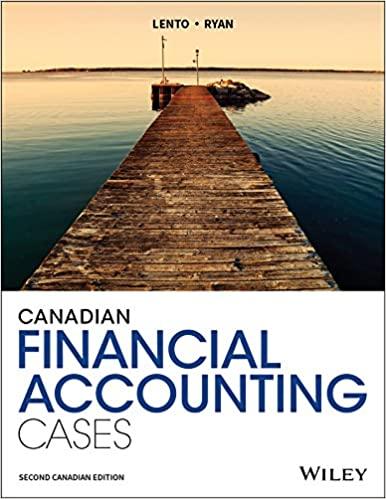On January 1, 2017, Alexander Properties (AP), a private enterprise, transitioned to IFRS from ASPE. Brian McParland,
Question:
On January 1, 2017, Alexander Properties (AP), a private enterprise, transitioned to IFRS from ASPE. Brian McParland, the company’s Chief Financial Officer, was responsible for all financial reporting issues upon transition. As he read through the international standards, he often saw ASPE methods as an option for reporting under IFRS. In any instances where the ASPE method was still an option, he instructed the company’s controller, Fran Bouchard, to take the strategy “if it isn’t broken, don’t fi x it.” It is now January 5, 2018, and the management team at AP is excited for some big expansion plans that are set to start this fiscal year and continue for the next five years. In order to finance the large expansion plan, management has decided to take the company public within the next couple of years. As such, there is a signifi cant focus on maintaining a strong net income and key financial ratios such as return on equity and return on assets. When IFRS was adopted at the beginning of 2017, Brian did not see the benefit of recording the investment properties at their fair value. At that time, the main user of the financial statements was the bank. Th e bank was not concerned with the fair values of the properties. As the company contemplates the upcoming IPO, Brian is starting to wonder if it would make more sense for the company to use fair value accounting to account for its investment properties. Founded in 1990, Alexander Properties is well known for owning and operating commercial real estate. The company owns and operates several properties in large metropolitan areas including downtown Toronto, Montreal, and Vancouver. AP is headquartered in Toronto. Most recently, the company acquired two premium properties in New York City. Alexander Properties operates as a private company but decided to transition to IFRS from ASPE as it always viewed becoming a public company as a viable option for obtaining fi nancing. Over the past fi ve years, the company has experienced significant growth as a result of the purchase of seven new properties. The company’s accounting department is managed by the controller, Fran Bouchard. Fran has a great understanding of the business and the relevant accounting as she has been the controller for almost 15 years. In light of the decision to take the company public, it has become a priority of Fran’s to evaluate the statement of financial position and look for areas that could be improved. Th e most significant asset on the statement of financial position of the company is its investment properties. The company currently follows the cost method to account for these properties. By following this method of accounting, the true value of the asset is not reflected on the statement of financial position. At this point, Fran is not sure if there are fair value options under IFRS with respect to investment property. Earlier that week, Brian McParland had asked Fran to present a summary of her fi ndings to the management team in a meeting at the end of the month. Brian was responsible for the notion “if it isn’t broken, don’t fix it.” He stressed that if she thought a method of accounting should be changed, he wanted a detailed explanation of why the change makes sense for Alexander Properties. His concern was focused on the long-term impact of any accounting change. Specifically, Brian wants to know what the impact would be on th current year net income, return on equity, and return on assets if any new accounting policies were adopted. He wants to know what the differences are between the revaluation model and the fair value model. Th e 2017 financial statements can be found in Exhibit I. Although Brian is concerned about these issues, he said to Fran “if worse comes to worse, we can just try out the fair value model, and if we don’t like it, will just switch back.”
As the economy weakened during 2008 and 2009, AP was able to show modest growth. AP is built on a strong foundation and therefore did not endure significant losses during this time. Since the company’s inception in 1990, fostering long-term relationships with tenants has been a priority. When the fi nancial crisis was at its peak, 70% of AP’s tenants were occupying office space for five or more years. In order to foster these long-term tenant relationships, AP provides competitive prices in premium locations of the city. The companies AP serves have a desire and a need to be in the heart of the city.
At the end of 2009, AP purchased two premium properties in New York City at a discounted price. Although the properties required a significant amount of upgrading, AP was able to get them up and running in a very short period of time. Currently both locations have a combined vacancy of 15%. When AP purchased the properties, management had forecasted both locations would remain 40% vacant until at least the end of 2012. As the two properties in New York City have been very successful, AP is planning on expanding further into the United States.
The company owns and operates 10 properties. In December 2017, the company had a real estate company value the properties to comply with the new IFRS standards. The fair values of the 10 properties can be found in the investment property analysis from the accompanying notes to the fi nancial statements in Exhibit II.
Required Prepare a report for Brian to assess whether it is optimal for the company to use fair value accounting to account for AP’s investment properties.
Step by Step Answer:

Canadian Financial Accounting Cases
ISBN: 9781119277927
2nd Canadian Edition
Authors: Camillo Lento, Jo Anne Ryan






